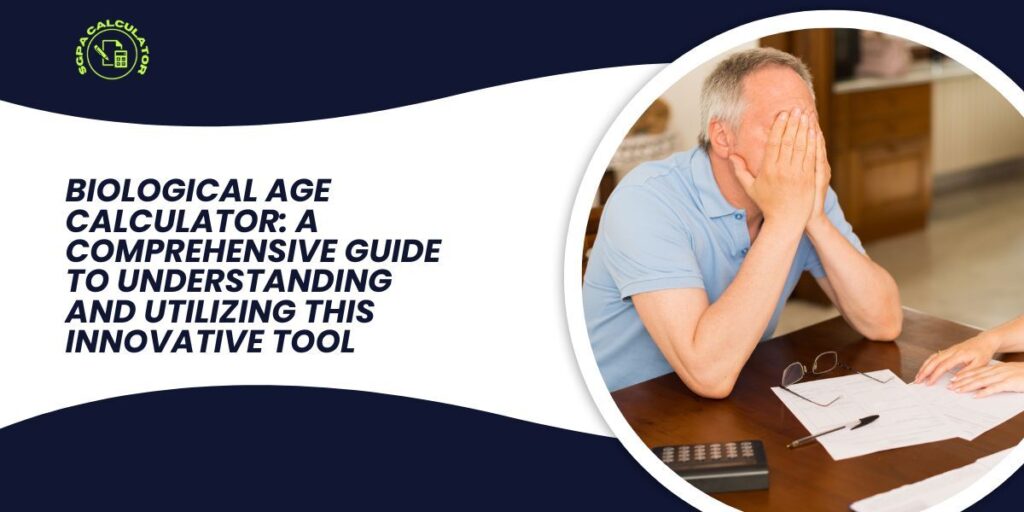In the quest for longevity and healthy living, understanding one’s biological age has become increasingly pertinent. While chronological age simply indicates the number of years one has been alive, biological age delves deeper, reflecting the physiological condition of the body and its systems. Advancements in science and technology have led to the development of sophisticated tools like the Biological Age Calculator, offering insights into an individual’s overall health and potential lifespan. In this article, we will explore the concept of biological age, delve into the science behind its calculation, discuss the significance of knowing it, and examine how this information can be leveraged to optimize health and well-being.
Understanding Biological Age
Biological age encapsulates the functional age of an individual’s body, taking into account various factors such as cellular health, organ function, lifestyle choices, and genetic predispositions. Unlike chronological age, which is fixed and increments annually, biological age can fluctuate based on an individual’s habits, environment, and overall health status.
At its core, biological age reflects the rate at which an individual’s body is aging internally, which may diverge significantly from their chronological age. For instance, two individuals of the same chronological age may exhibit contrasting biological ages due to differences in their lifestyle choices, stress levels, diet, exercise routines, and genetic makeup.
Science Behind the Calculation
The calculation of biological age involves a multidimensional approach, incorporating various biomarkers and physiological parameters to assess overall health and aging processes. While different biological age calculators may employ distinct algorithms, they typically consider factors such as:
Use Calculator: Age Calculator
Genetic Markers: Certain genetic variations can influence how individuals age. Genetic testing can identify specific variations associated with accelerated or decelerated aging processes.
Biomarkers: Biomarkers encompass a range of measurable indicators, including blood pressure, cholesterol levels, blood sugar levels, inflammation markers, telomere length, and hormone levels. These biomarkers provide insights into cardiovascular health, metabolic function, immune response, and cellular aging.
Lifestyle Factors: Lifestyle choices such as diet, exercise, smoking habits, alcohol consumption, sleep patterns, stress management, and environmental exposures profoundly impact biological age. For instance, regular exercise has been shown to promote cardiovascular health, improve metabolic function, and mitigate age-related decline.
Physiological Assessments: Advanced medical assessments, such as cardiovascular fitness tests, pulmonary function tests, cognitive assessments, and imaging techniques like MRI scans, can offer valuable data for estimating biological age.
Significance of Knowing Your Biological Age
Understanding one’s biological age holds immense significance for several reasons:
Health Optimization: Awareness of one’s biological age enables individuals to identify areas of concern and take proactive measures to optimize their health. By addressing modifiable risk factors and adopting healthier lifestyle choices, individuals can potentially reverse or slow down the aging process and reduce the risk of age-related diseases.
Read Our Blog: Cat Age Calculator
Personalized Health Planning: Knowledge of biological age facilitates personalized health planning by allowing individuals to tailor their diet, exercise regimen, preventive screenings, and medical interventions according to their specific needs and risk profile.
Longevity Strategies: Armed with insights into their biological age, individuals can implement longevity strategies aimed at extending healthy lifespan and enhancing overall well-being. These strategies may include anti-aging interventions, nutritional supplementation, stress reduction techniques, and mindfulness practices.
Motivation and Accountability: Tracking changes in biological age over time can serve as a motivational tool, encouraging individuals to stay committed to their health goals and maintain positive lifestyle changes. It fosters accountability and empowers individuals to take control of their aging trajectory.
Utilizing the Biological Age Calculator
The Biological Age Calculator serves as a valuable tool for estimating biological age and assessing overall health status. While numerous online platforms and mobile applications offer biological age calculators, it’s essential to choose reputable sources that utilize validated algorithms and incorporate a comprehensive range of biomarkers and lifestyle factors.
To utilize a Biological Age Calculator effectively, follow these steps:
Data Input: Provide accurate information regarding your age, gender, height, weight, medical history, family history, lifestyle habits, and any relevant biomarker measurements. Some calculators may require genetic data obtained through DNA testing.
Analysis: The calculator will process the input data using its algorithm to generate an estimate of your biological age. It may present the results in comparison to your chronological age and provide insights into specific areas of health that may require attention.
Interpretation: Interpret the results in conjunction with other health assessments and consult with healthcare professionals, if necessary, to gain a comprehensive understanding of your health status and potential areas for improvement.
Action Plan: Develop an action plan based on the insights gleaned from the biological age calculation. This may involve making lifestyle modifications, seeking medical advice for underlying health issues, or implementing preventive measures to mitigate future risks.
Conclusion
Biological Age Calculator represents a groundbreaking tool in the pursuit of optimal health and longevity. By offering insights into the internal aging processes of the body, it empowers individuals to make informed decisions regarding their health and well-being. Understanding and monitoring biological age allows for personalized health planning, targeted interventions, and proactive measures aimed at promoting vitality and extending healthy lifespan. As scientific knowledge continues to advance, integrating biological age assessment into routine healthcare practices holds the promise of revolutionizing preventive medicine and fostering a paradigm shift towards proactive health management. Embrace the power of the Biological Age Calculator today and embark on a journey towards a healthier, more vibrant future.





